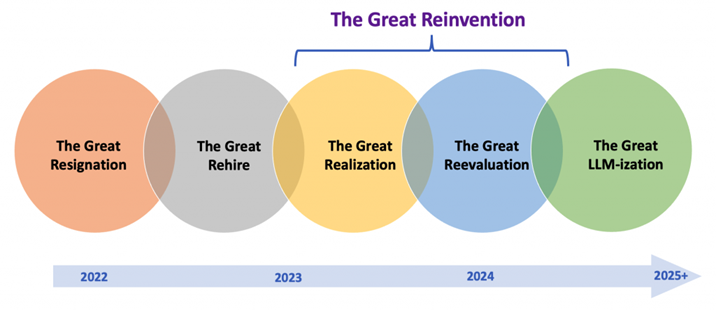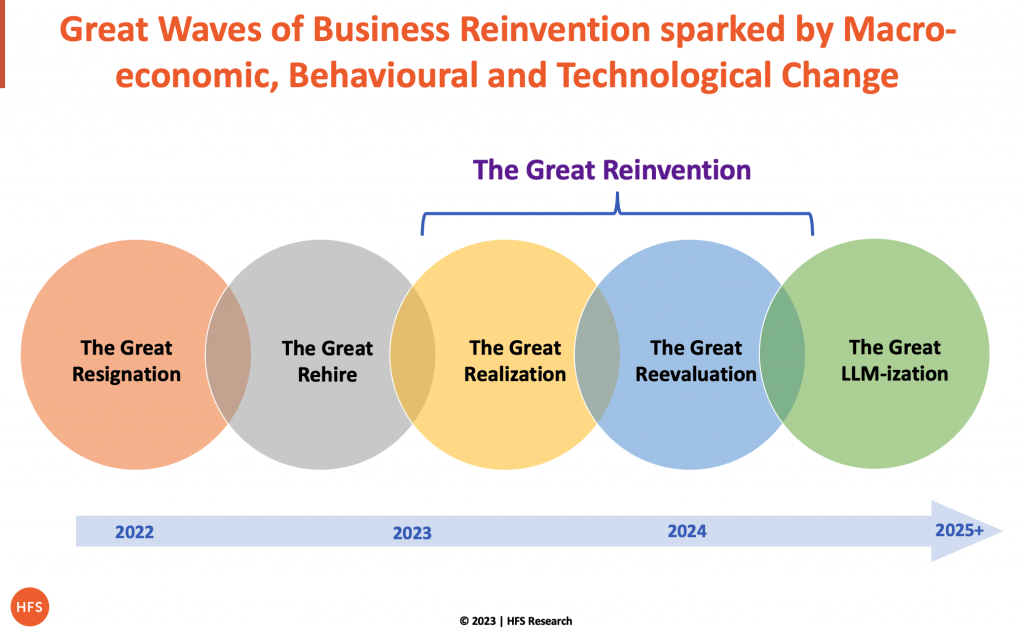Reinventing Businesses: From the Great Resignation to the Great LLM-ization
The pandemic triggered a major shift in workplaces, with remote work and digital-first methods. This led to the Great Resignation as employees left jobs. The Great Rehire and Attrition prompted HR departments to reassess talent management and employee experience, encouraging companies to embrace new work approaches.
The 2+ year experience impacted us greatly, costing many loved ones and changing work/life perspectives. Now, we face a new reality with undefined regulations, making adjustment challenging in the days of the Great Reinvention.
People can’t be compelled into offices anymore. Specialists advise adapting to the evolving work environment to rejuvenate. Success demands an adaptive mindset, embracing innovation, breaking from tradition, and consciously unlearning. Nils Vesk, Australia’s ‘Innovation Architect,’ suggests companies continually rethink and readapt.
Reinventing Businesses with Conversational AI
In this new context, technology support, particularly conversational AI, plays a vital role in transforming the workplace. Conversational AI helps improve employee productivity and efficiency, streamlines processes and enhances the hybrid work experience overall. Because implementing a hybrid workplace is about more than just allowing employees to choose where they work. Instead, it centres on equipping them with the right tools and resources that make hybrid working productive and sustainable in the long term.
Conversational AI enhances remote work by improving communication with HR or IT, streamlining processes, and boosting access to information. Virtual AI assistants aid effective communication, automate tasks, and offer personalized training, leading to improved collaboration, quicker problem-solving, reduced stress, increased engagement, and job satisfaction.
Employee Reskilling with Conversational AI
Employees must reskill and upskill to stay competitive and adapt to changing industries. By 2025, half will need reskilling, says the World Economic Forum. Conversational AI offers personalized learning experiences for quicker and more effective skill acquisition, enabling meaningful application in their work.
Heading towards the Great LLM-ization?
AI transforms how we interact with the internet, reshaping businesses. Large Language Models are fast to learn. Jobs may vanish, but new ones, like prompt engineers, emerge. Mastering “prompting” becomes a standard skill, necessitating ongoing reskilling and self-improvement for employees.
- Iterating– asking the same question in different ways, exploring multiple responses to the same prompt, comparing the results, detecting bias, and being aware of it.
- Evaluating responses. Asking questions differently, discovering contradictions, and asking to self-assess are key to ensuring the information is correct.
- Eradicating bias by constantly expanding the understanding of bias in LLMs. ChatGPT, for example, is biased based on the underlying approach used to build the LLM and the data used to train it.
- Generative Thinking– the big challenge as we approach the Great LLM-ization is to seek new ideas beyond the constraints of current LLMs constantly. For example, asking ChatGPT to summarize, synthesize and find the contradictions in the result it creates is only a starting point.
Conversational AI aids continuous learning beyond formal programs, fostering a culture of innovation. Offering access to learning resources and expert advice motivates employees to acquire new skills, staying ahead in the fast-changing job market.
Microelectronic Solutions represents Druid in Australia with local certified resources and expertise. Contact us at Microelectronic to discuss your business requirements in the area of A.I. digital assistants and chatbots, including business applications of ChatGPT.
![]()
Phone: +61 2 94176644, mes@microelectronic.net


